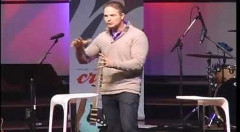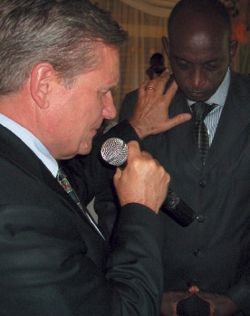Reading your Bible, evangelizing, going to church and praying daily are truly great things for a believer. But are we discipling like we should?

Page 5 of 5

Reading your Bible, evangelizing, going to church and praying daily are truly great things for a believer. But are we discipling like we should?

Can discipleship gain a foothold in the 21st-century church? It must if the church is to fulfill its true call.

How can a pastor know when he has developed a leader if he does not have a definition? Here are some characteristics of godly leaders.

Church small groups are still making an impact on individuals. Here's how they're doing so.

Rick Warren says that in order to fulfill the Great Commission, we have to mobilize every member for ministry. Here are some lessons for doing that.

Small group leaders have a tremendous responsibility. Find out what kind of example they should set for their members.
 Dietrich Bonhoeffer’s book The Cost of Discipleship is a classic. It powerfully describes Christ’s call for men to “come and die” in order to be His disciple.
Dietrich Bonhoeffer’s book The Cost of Discipleship is a classic. It powerfully describes Christ’s call for men to “come and die” in order to be His disciple.
In as many times as I have discussed that book with friends, I’ve never thought about an equally important concept—until now. Since a true disciple of Christ will become a disciple-maker of others (after all, that is Christlike), we must also consider the cost of disciple-making.
Initially, we may think the cost is time and energy. Certainly this is true. Disciple-making is a commitment to open up your life to another person. It’s an act of service that requires long hours, late-night calls, inconvenient conversations and out-of-the way trips.
 There is a lot of talk about discipleship these days—and it is about time. Jesus seemed to think discipleship was a big deal, putting it as the heart—and the verb—of the Great Commission to "make disciples of all nations." Yet it seems discipleship has fallen on hard times in many churches in the West—for example, English-speaking places like the U.S., Canada, Australia and England, where there are Christians who are just not as desperate and committed as their sisters and brothers in the Two-Thirds World.
There is a lot of talk about discipleship these days—and it is about time. Jesus seemed to think discipleship was a big deal, putting it as the heart—and the verb—of the Great Commission to "make disciples of all nations." Yet it seems discipleship has fallen on hard times in many churches in the West—for example, English-speaking places like the U.S., Canada, Australia and England, where there are Christians who are just not as desperate and committed as their sisters and brothers in the Two-Thirds World.
I would go so far as to say that our discipleship model is broken. I would like to suggest some areas where we are broken and hopefully provide some solutions about how to fix them.
 Discipleship is cycling to the top as a priority for many pastors. Many churches are trying to change their culture to one of making disciples. But how would you actually implement a change of that magnitude—especially on a sustainable basis?
Discipleship is cycling to the top as a priority for many pastors. Many churches are trying to change their culture to one of making disciples. But how would you actually implement a change of that magnitude—especially on a sustainable basis?
I’m a men’s discipleship specialist, but what we’ve learned working with 35,000 churches also applies to discipleship in general. What follows is a plan I shared with a pastor recently. Of course, you can adapt this in many ways:
Dear Pastor,
Here’s what I would do if I were in your shoes. My thought is to keep the plan as focused on discipleship and as simple as possible. The following represents a plan to help each person understand and implement discipleship for themselves and others in three ways (salvation=call, growth=equip, service=send).
 Discipleship has become quite the buzzword. Books, conferences and writings abound on the topic. Most churches understand the need for discipleship but many are struggling to create effective discipleship strategies. Here are 5 reasons why your discipleship strategy may be stuck:
Discipleship has become quite the buzzword. Books, conferences and writings abound on the topic. Most churches understand the need for discipleship but many are struggling to create effective discipleship strategies. Here are 5 reasons why your discipleship strategy may be stuck:
1. You Don’t Actually Have a Strategy. Most churches claim to have a discipleship strategy. Midweek meetings, Sunday school classes, small groups and other gatherings are frequently mentioned when asked to describe the strategy. Meetings don’t entail a strategy. Churches need a discipleship plan that encompasses everything they do based on their congregation’s specific biblical needs. Leadership teams should ask, “What will it take for our people to take the next steps toward maturity in Christ?” A specific plan should be created based on the answer to this question.

A practical plan for engaging the entire church in revolutionary disciple-making
We all want to do something revolutionary. I know I do. After 40 years in ministry, I can say that I have been involved in a life- and world-changing revolution. Will you join me in this mandate to any and every mature disciple of Christ?
This revolution started 2,000 years ago when Jesus uttered the words, "Follow me" to 12 men He would spend His time on earth with teaching and showing them what it meant to be His disciple. Through this simple concept, Jesus reproduced Himself in His followers.
The revolution continued as these disciples led by Peter established the early church, followed by Paul, who followed Jesus' ex-ample as he discipled Timothy, Titus and Silas.
Since then, faithful believers have sporadically picked up this spiritual fathering concept.
Call it what you want—mentoring, discipling, coaching or spiritual fathering or mothering—it all boils down to the idea of caring about each other's spiritual growth.
Paul grasped this truth when he told Timothy, "You then, my son, ... the things you have heard me say in the presence of many witnesses entrust to reliable men who will also be qualified to teach others" (2 Tim. 2:1-2, NIV). Paul exhorted his disciple, Timo-thy, to find another disciple who would disciple another.
 My friend Charles wanted a mentor. He was eager to learn the ropes of ministry, so he asked an older pastor for training. The pastor agreed—but Charles soon realized the man wanted a valet, not an apprentice. Charles became the man’s “armor bearer.”
My friend Charles wanted a mentor. He was eager to learn the ropes of ministry, so he asked an older pastor for training. The pastor agreed—but Charles soon realized the man wanted a valet, not an apprentice. Charles became the man’s “armor bearer.”
The man never took Charles on hospital visits, involved him in ministry assignments or prayed with him. Instead, Charles was expected to carry the pastor’s briefcase, fetch coffee and take suits to the cleaners—with no salary offered. In this case, “armor bearer” was a spiritualized term for “slave.”
This bizarre trend became popular in churches 20 years ago, but it still thrives. It appeals to insecure leaders who need an entourage to make them feel important. Some pastors have even assigned trainees to serve as bodyguards—complete with dark glasses and concealed weapons. These young men are instructed to keep people away from the pastor so he doesn’t have to talk to anyone after a church service (because, after all, the poor preacher might be “drained of his anointing” if he fraternizes with common folks).
 What’s happened to real discipleship in America ... and how we can get back on track
What’s happened to real discipleship in America ... and how we can get back on track
Page 5 of 5